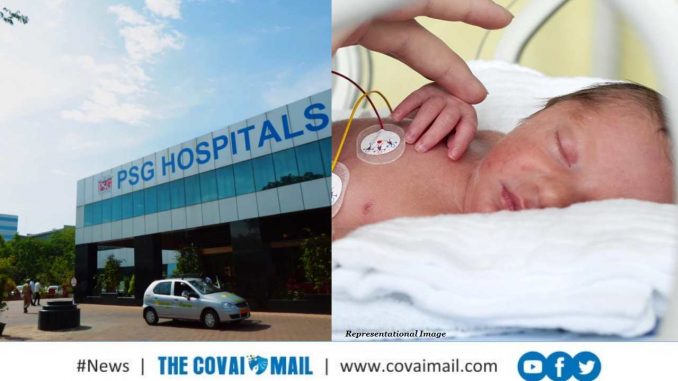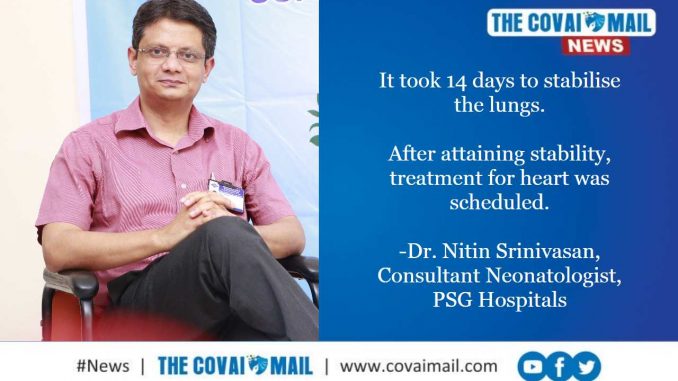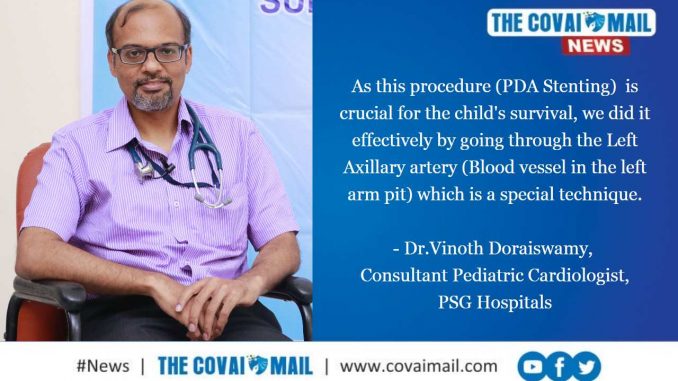
An antenatal scan done at PSG Hospitals revealed to a pregnant mother that her soon to be born baby had a critical heart defect. Doctors advised the expecting parents that the baby should be delivered at a multi-speciality hospital as the baby would require emergency treatment after birth.

Unfortunately, the delivery happened prematurely (at 8 months) at a private hospital in a nearby place, 40 km away. The pre-term baby was just 1.2 kg weight at birth.
The parents brought the new-born to PSG Hospitals immediately after birth via ambulance and it was confirmed that the baby’s lungs were immature and the heart had a serious defect, Tetrology of Fallot with Pulmonary Atresia. In this heart defect, there is a hole between the two lower chambers of the heart and the blood vessel supplying impure blood to the lungs (pulmonary artery) is completely blocked. So the lungs receive blood supply only from the Patent Ductus Arteriosus (PDA) – a naturally occurring temporary blood vessel between pulmonary artery and aorta (blood vessel supplying pure blood to the body).
The PDA naturally closes in the first few weeks after birth in normal babies and does not cause any problems. But such a situation would be life-threatening in this baby as it is the only source of blood supply to the lungs
With such a critical condition and pre-maturity, the baby was in immediate need of multidisciplinary care. The first task in hand for the doctors was to stabilize the lungs and then do a PDA Stenting, so that sufficient blood flow could be established. After this, once the child achieves adequate body weight, the curative open-heart surgery could be scheduled.

Dr. Nitin Srinivasan, Consultant Neonatologist, PSG Hospitals said “The baby’s lungs were not expanding like how it should be. So we needed to ensure that it does. Before doing that, the baby should be given sufficient warmth, hence she was kept in an incubator. Then she needed special ventilator support (high frequency oscillator) which helps in treating stiff lungs and multiple doses of Surfactant (a liquid medicine poured directly into the lung) was needed to facilitate that. It took 14 days to stabilise the lungs. After attaining stability, treatment for heart was scheduled.”
Dr.Vinoth Doraiswamy, Consultant Pediatric Cardiologist, PSG Hospitals said ” After 14 days, the PDA began to close and since this is the only source of blood supply to the baby’s lungs, it needs to be kept open for a period of time until the baby is ready for an open-heart surgery to fix the hole in the heart and create a new tube to the lungs. So in order to survive up to that time, the baby immediately needed a PDA stenting.”

“PDA stenting is frequently done for children who are at least 3-3.5 kg. The weight of this baby at the time of procedure was just 1 kg. Doing this procedure for such a low weight baby is very rare. As this procedure is crucial for the child’s survival, we did it effectively by going through the Left Axillary artery (Blood vessel in the left arm pit) which is a special technique instead of going through the groin which is the usual approach.”
“After the stenting, the baby was moved to ICU and taken off ventilator the next day. It is now almost 2 weeks since the procedure. The baby will be discharged soon. Once the baby is big enough for the open-heart surgery, it will be performed by our cardiac surgeon.”
The doctors said that there were several challenges in doing this procedure to a pre-term very low weight baby. The amount of blood in her body will be just 70 – 80 ml, so minimising blood loss during surgery is a major challenge. Such small babies are prone to hypothermia (loss of body temperature) and hypoglycemia (low blood sugar levels) during the procedure. Ventilating and giving anaesthesia for such a small baby is also a difficult task. Hence such a procedure should be done as quickly as possible in the shortest possible time.
“This is basically a team effort. We had all infrastructure and experts to provide this level of care to the child. Dr.Lalitha, Fetal Medicine Specialist and I diagnosed the baby’s heart condition before birth, Neonatology team headed by Dr.Ramesh and Dr.Nitin helped in fixing the issue with immaturity of lungs, Dr.Prem Krishna, Adult Cardiologist and I did the PDA stenting. Dr.Elango, Interventional Radiologist, helped us with blood vessel access using Ultrasound guided technique, Senior Anaesthetist Dr.Ganeshan aided in administering the anaesthesia efficiently”, Dr.Vinoth said.
“Doing a foetal echo at 4-5 months of pregnancy is very important to identify if the baby has any heart related complexities. This will provide time for the parents to mentally and financially prepare themselves on what to do and be prepared to take timely decisions.”, he added.
